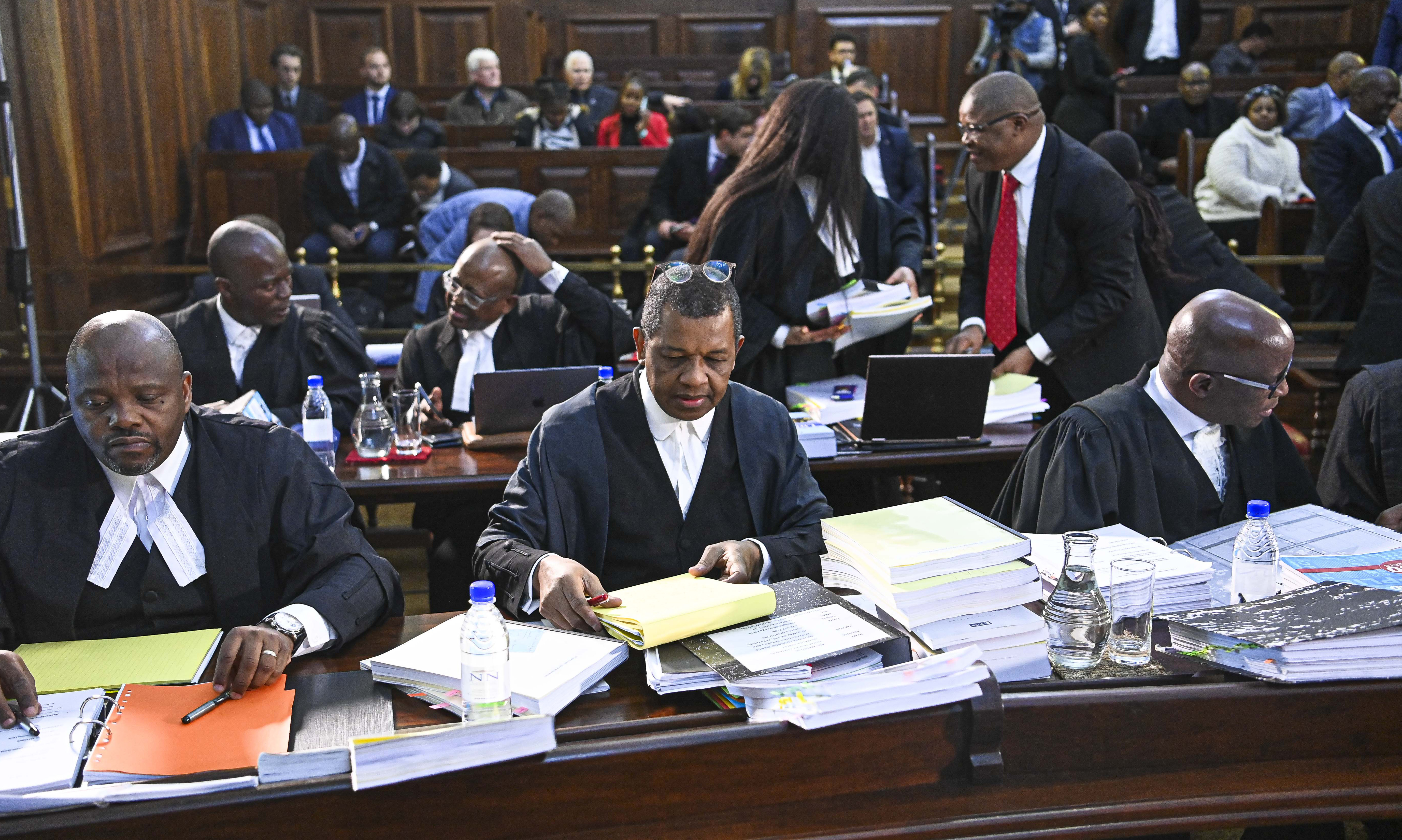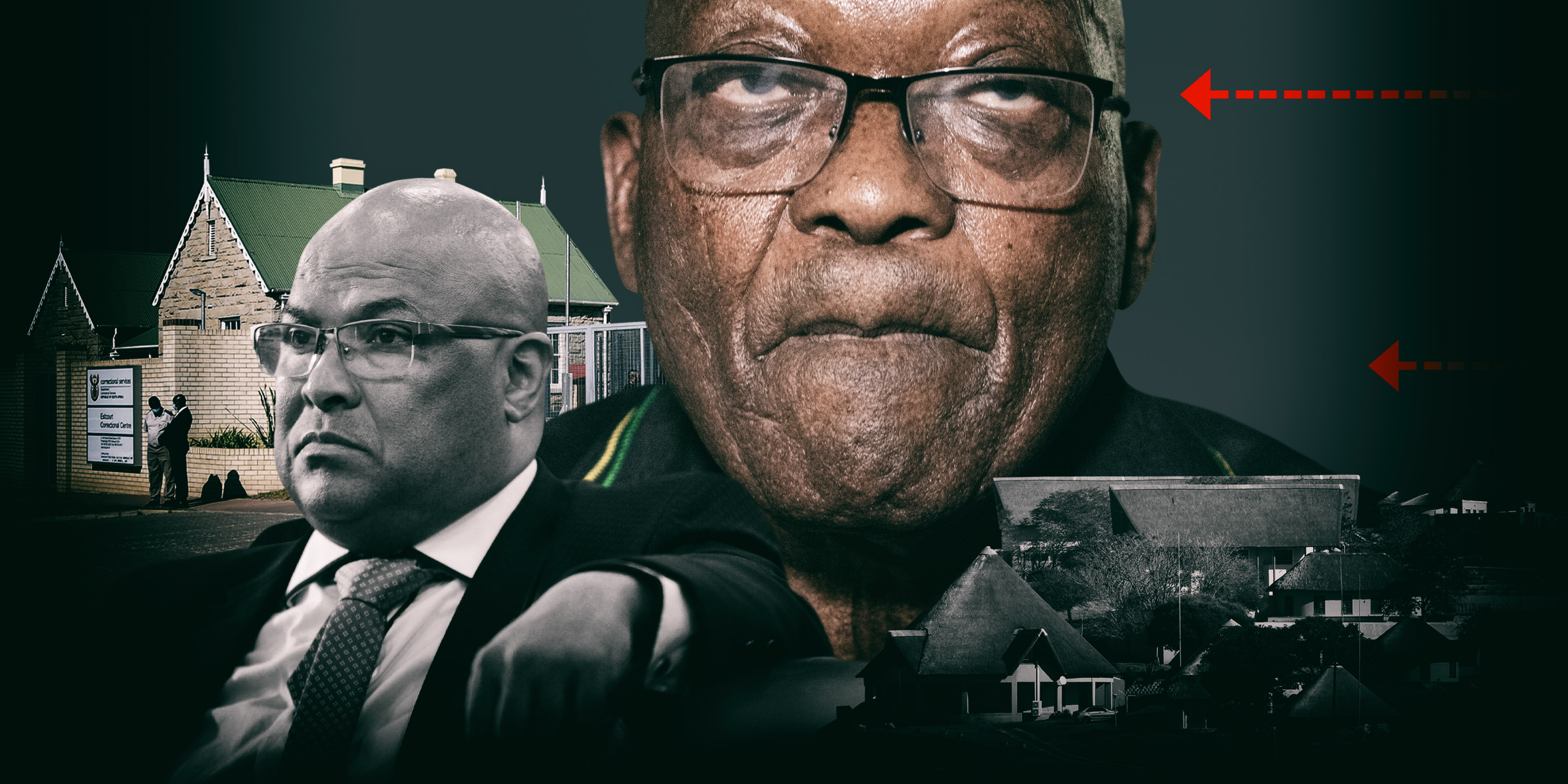Former Correctional Services head Arthur Fraser had erred “spectacularly” in law and rationality when he summarily dismissed a recommendation by the Medical Parole Advisory Board that former president Jacob Zuma did not qualify for medical parole, the Supreme Court of Appeal (SCA) heard on Monday.
Acting on behalf of the Helen Suzman Foundation, advocate Max du Plessis SC told the Full Bench that Fraser was the national commissioner, “not the medical commissar”, at the time he made his decision.
“He doesn’t have the power to arrogate a wider power to himself to determine the medical question or ignore the board.”
 A handful of people came to show their support for former president Jacob Zuma on Monday, 15 August 2022. (Photo: Kgothatso Mokoena)
A handful of people came to show their support for former president Jacob Zuma on Monday, 15 August 2022. (Photo: Kgothatso Mokoena)
Fraser had thought he could “do better” than the board — that he could override the decision that was based on the reports of five specialist doctors, said Du Plessis, but he had not pointed out any jurisdictional fact that would allow him to do so.
Fraser — a known Zuma ally — authorised the medical parole release on 5 September 2021, just days after the Medical Parole Advisory Board had advised against it, given that Zuma was not terminally ill or physically incapacitated. The release came just two months after the former president was sentenced to 15 months in jail by the Constitutional Court on contempt charges.
Zuma was imprisoned on 8 July 2021, sparking a wave of riots across his home province of KwaZulu-Natal, and to a lesser extent Gauteng, that led to more than 300 deaths and cost the economy of the eThekwini metro alone more than R70-billion, according to its business chamber. Should Zuma lose the case relating to his medical parole and have to return to prison, there are fears that his supporters will again be incited to riot and loot.
Zuma’s release was challenged in the Pretoria High Court by the Democratic Alliance, the Helen Suzman Foundation and AfriForum last year. The court found in their favour in December, with the presiding judge, Elias Matojane, calling the release unlawful and setting it aside.
Appeal
Zuma was ordered back to jail to complete his sentence. But within hours of Matojane’s judgment, the Department of Correctional Services and Zuma made known their intentions to appeal against the decision at the SCA.
Du Plessis told the SCA that according to the appropriate regulations, it was up to the board to make a recommendation to the commissioner relating to medical parole. This was an “embedded power”, he said, and the recommendation would be value-based.
“As the high court put it, Parliament deliberately took the responsibility to diagnose terminal illness or severe physical incapacity away from the treating physician and left it to an independent board to make the expert medical diagnosis.”
 Carl Niehaus at the Supreme Court of Appeal in Bloemfontein on Monday, 15 August 2022. (Photo: Kgothatso Mokoena)
Carl Niehaus at the Supreme Court of Appeal in Bloemfontein on Monday, 15 August 2022. (Photo: Kgothatso Mokoena)
Quoting from his heads of argument, Du Plessis said that the National Council for Correctional Services completed its review of the South African medical parole policy in January 2010.
“The council proposed that the medical diagnosis of the medical practitioner, which puts the process in motion, be certified by a medical advisory board, to be established in its region,” said Du Plessis.
He added that the “critical sentence” which followed was that: “The role of the national commissioner, or the parole board, or the minister, as the case may be, will therefore be to establish the other two criteria for eligibility — namely, the risk posed to society and whether there is adequate placement for the offender, since the medical leg of the three-pronged decision would have been established by the board.”
Fraser was not entitled to inflate his jurisdiction, he said.
Specialist doctors
A number of specialist doctors had supplied reports that were utilised by the board in making its decision. The board found that Zuma suffered from various comorbidities, “but those are not the same as terminal illnesses”, said Du Plessis.
“They are not irreversible and won’t lead to imminent death. They make your future medical condition uncertain, but they are not the same as: ‘You are certainly about to die and therefore are entitled to terminal illness status under the statute.’”
The board declared that Zuma’s treatment for his undisclosed condition had been optimised. Given all the available records, it concluded that Zuma was stable and did not qualify for medical parole. But, said Du Plessis, the board did stress: “We are open to considering other information should it become available.”
Visit Daily Maverick's home page for more news, analysis and investigations
There was no emphatic evidence of terminal illness or severe physical incapacity, said Du Plessis, as advocate Ismail Jamie SC, acting for the Democratic Alliance, had told the court earlier.
Fraser had “cherry-picked” the medical reports to decide on Zuma’s parole, said Du Plessis. He had utilised the reports of the former president’s personal military physician, and a Correctional Services physician, which recommended medical parole, but had not mentioned the reports from the specialists that the advisory board had relied on to deny the parole.
Nowhere had Fraser said that Zuma suffered from a terminal illness or physical incapacitation — requirements for medical parole — said Du Plessis, and Zuma had not said that he was terminally ill or incapacitated either.
‘Textbook spectacle of unlawfulness’
Fraser had “committed palpable errors”, said Du Plessis. “And the evidence and the law point overwhelmingly to the fact that Mr Fraser’s efforts to ignore or to override the board are a textbook spectacle of unlawfulness.”
In his submission, Jamie called out the hypocrisy of Zuma’s argument that he needed full medical care, including specialists, saying that when Zuma was imprisoned at the Estcourt Correctional Centre, he had round-the-clock medical care from the military, with no specialists in attendance.
Zuma was sent to the Heart Hospital in Pretoria for a medical condition, where he recovered, and was then sent home to Nkandla with the same military medical team he had in prison, none of them specialists.
“Mr Zuma was not sent to a tertiary facility as recommended [by Fraser], but was sent home to Nkandla with a military health service detail he had at Estcourt,” said Jamie.
He said Fraser and Zuma had not challenged the DA’s argument that neither admitted in their affidavits that the former president had a terminal disease.
 Advocate Dali Mpofu (centre) at the Supreme Court of Appeal in Bloemfontein to represent former president Jacob Zuma on Monday, 15 August 2022. (Photo: Kgothatso Mokoena)
Advocate Dali Mpofu (centre) at the Supreme Court of Appeal in Bloemfontein to represent former president Jacob Zuma on Monday, 15 August 2022. (Photo: Kgothatso Mokoena)
The day began with advocate Mantlheng Mphahlele arguing for the commissioner of Correctional Services, and afterwards, Dali Mpofu SC arguing for Zuma.
‘Fraser within his rights’
Mphahlele told the justices that Fraser was within his rights to use his discretion to make a decision about the medical parole because the recommendations of the board were not binding. The report from the board was simply an “additional report”, he said, that could be used by the commissioner in coming to a determination.
In response to a question from Justice Nambitha Dambuza about why Parliament would establish the statutory body if its recommendations held so little weight, Mphahlele said it was “in order to provide an independent additional report which needs to be considered by the national commissioner, and he has done so”.
The recommendations of the board were not “final”, he reiterated, and should not be elevated above the reports of the two doctors who had examined Zuma. “They must be treated equally.”
As for there being no mention of Zuma having a terminal illness, Mphahlele said that because the board had found the former president to be “stable”, it did not mean he was not suffering from a terminal illness. Such an illness could simply be under control because of medical intervention.
Mpofu told the court that “human rights” should be the starting point on the matter — whether Zuma’s constitutional rights had been “infringed, limited, violated or not”.
He emphasised that the board was an “advisory” one.
“The argument of the respondents is that the Medical Parole Advisory Board is capable, entitled, and within its powers to overrule, ignore or second-guess the recommendation of [the reports from the two doctors who examined Zuma]. But the national commissioner is disentitled, not allowed to second-guess, overrule or not entitled to overrule the advisory board.”
All sorts of people had advisers, he said, including ministers. “And I am sure they take some advice [and discard other advice].”
It was not correct, he said, that the board’s recommendations “assume some royal power”. He agreed with Mphahlele that the board’s findings were an additional recommendation that could be considered by Fraser, along with other factors.
Judgment was reserved. DM




 Advocate Dali Mpofu at the Supreme Court of appeal in Bloemfontein to represent former president Jacob Zuma yesterday. (Photo: Kgothatso Mokoena)
Advocate Dali Mpofu at the Supreme Court of appeal in Bloemfontein to represent former president Jacob Zuma yesterday. (Photo: Kgothatso Mokoena)